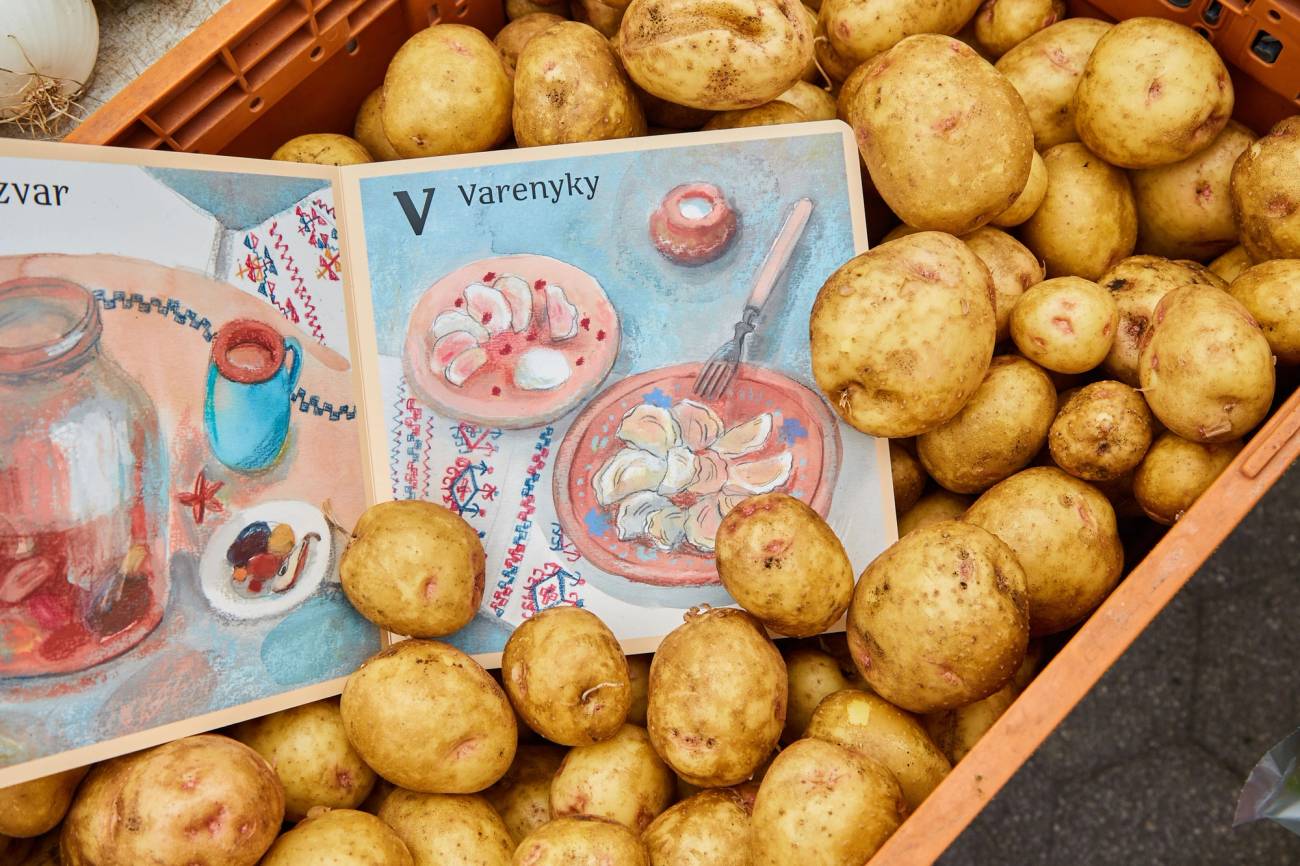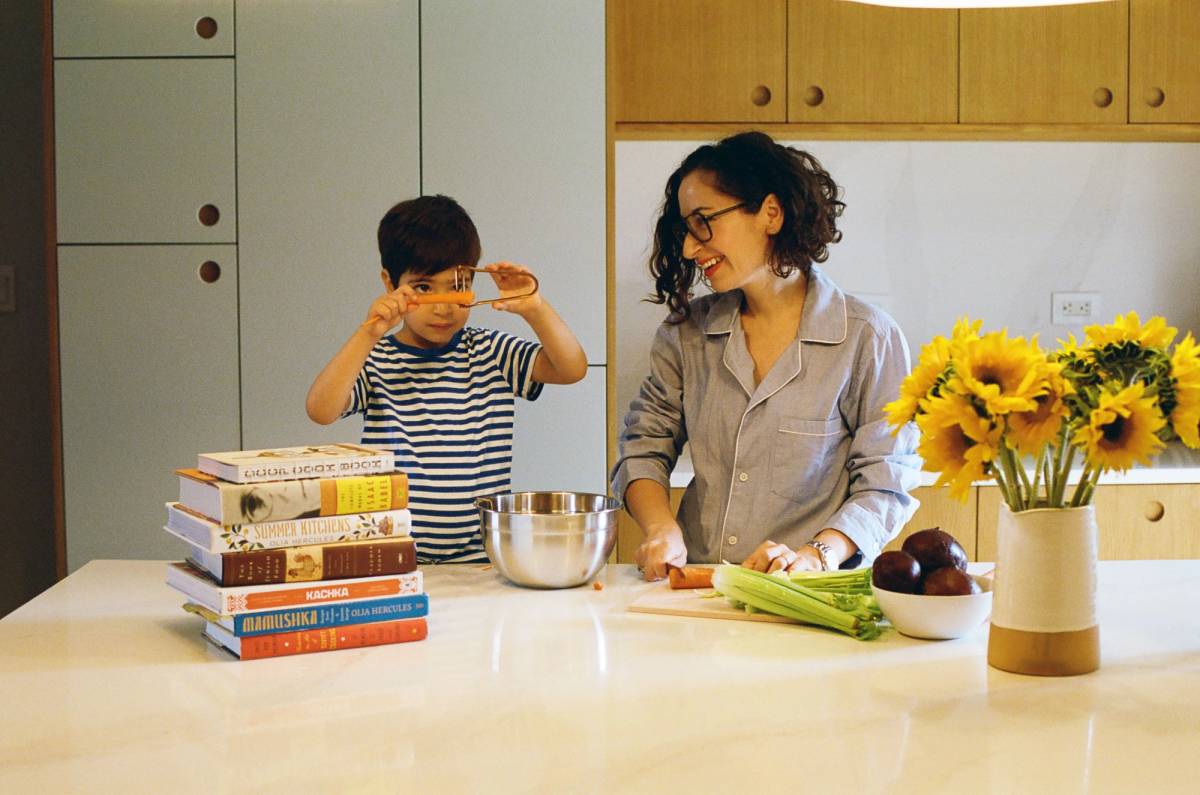Borscht and Beyond
Alina Sokolowsky’s children’s book preserves the flavors of Ukraine for the next generation

Courtesy Alina Sokolowsky

Courtesy Alina Sokolowsky

Courtesy Alina Sokolowsky
Alina Sokolowsky never dreamed of being a children’s book author. But as a Jewish immigrant who left Ukraine in 1989 when she was 5 years old, Sokolowsky felt her culture slipping further and further away. Living in New York, she was always looking for ways to preserve her Ukrainian culture. Now, as a mother to a kindergartner—and as someone with a knack for storytelling—she has published a book to pass down her memories to the next generation: B Is for Borscht, a celebration of Ukrainian food from A (akroshka) to Z (zapekanka), aimed at children of all ages.
“I’ve always had ideas around preserving our immigrant food memories,” said Sokolowsky. “I turned 6 by the time we arrived, so because I was so young when we left, the things that I remember from Ukraine are very different from the things that my parents remember. One of the few things that I have is my memories of the smells, the foods, and the dishes. Everyone has that scent that brings them back home.”
For about 10 years, Sokolowsky would document the ideas she had about how to hang onto her memories from Ukraine, tearing out articles, and saving them in a folder. At the same time, her career as a brand strategist took off, as did her personal life—meeting and marrying her husband, and giving birth to their son—so her dreams of creating something to preserve her Ukrainian culture took a back seat. She always assumed that one day she’d be able to bring her husband and son to visit Chernivtsi, Ukraine, where she was born, and show her family more about her heritage. But once Russia invaded Ukraine in 2022, she knew she had to switch gears and act fast. “Right then I felt like I had to do something, because there’s actual urgency to preserving these ideas, memories, scents, and flavors, because I may not be able to show my son one day,” she said.
Sokolowsky was lucky to have returned to Ukraine for a visit in 2009, along with her parents. She credits that trip—being able to see the places her family lived and worked—as a defining moment in continuing her strong connection to her culture. “My son was born in America so he’s first generation,” she said. “I grew up with Ukrainian parents, so no matter how many years we’ve lived here, they’ll always be Ukrainian Jews, but even I feel disconnected and removed. And so for my son, it’s even harder for me to try to create that connection.”
Feeling a sense of urgency from the war, Sokolowsky decided to self-publish a picture book for her son to help him feel connected to their Ukrainian heritage. “At first, I thought I would just do it for my son and have it be a family artifact,” she said. But once Sokolowsky got going, the project morphed into something larger. She looked for an illustrator to bring her family’s Ukrainian food to life, and wanted to work with someone from Russia to attempt to bridge the divide the war was causing. “Through a friend, I found this amazing illustrator, Nadya Suvorova, who was based in Moscow,” she said. Sokolowsky and Suvorova collaborated during the next few months, mainly through WhatsApp, as the war progressed.
B Is for Borscht follows the alphabet, with authentic Ukrainian foods listed for each letter. Dishes such as varenyky (Ukrainian dumplings) and golubtsi (stuffed cabbage) are accompanied by beautiful hand-drawings by Suvorova. It was important to Sokolowsky to include Jewish foods specific to Ukraine so that food culture that she treasures can live on. “If you go to the Ukrainian restaurants in the East Village, a lot of the items on the menu—like goulash and chicken paprikash—are actually Hungarian,” said Sokolowsky.
“We’re food people,” said Sokolowsky. “Over time, there are many things that diluted the connection to Ukraine, but the connection to our food, and the love for our food has never been diluted.” She fondly remembers Ukrainian foods being ever-present at holiday dinners, everyday dinners, and everything in between: “We’ve always eaten those foods, even if it’s Thanksgiving, or Passover, there’s still Ukrainian dishes at our table. And so that has always remained with my son. That’s what he eats.”

Courtesy Alina Sokolowsky
The process of choosing which foods to highlight was both nostalgic and challenging for Sokolowsky. Accompanying the book is a recipe for borscht by Sokolowsky’s mother, Irina. The bottom of the recipe card reads: “As with all immigrant recipes: There is no recipe! Just watch and learn.” “For my mom’s borscht recipe, there was no recipe,” she said. “I had to watch her one day, and just stopped her along the way to try and record.”
In the book, the author includes a map of Ukraine, as well as the photos and stories of Sokolowsky’s family of cooks and eaters. Through the process, she even managed to find a couple of handwritten recipes from her maternal grandmother.
Once the collaboration between author and illustrator was complete, the book was printed and sent off to Sokolowsky for distribution. It was a true labor of love, culminating in over 10 years of ideas, memories, and dreams. Sokolowsky was finally ready to announce her new book to the world, and she did on Oct. 6, 2023. The very next day, the Hamas massacre in Israel took place.
“I honestly felt like I couldn’t really promote it too much after what had happened,” Sokolowsky said. “Right now, all of us are so broken.” She felt the pain of the war in the Middle East in a unique way. Having a very recent point of reference from the war in Ukraine, where she felt tremendously supported by friends and family, she felt a unique sense of loss and loneliness post-Oct. 7. “When Russia invaded Ukraine, everyone reached out to show their support, and it was so heartening to see that and to be on the receiving end of that,” she said. “And yet, when Hamas attacked Israel, that was not what happened. And so it made it even worse, because I had a comparison point.”
While Sokolowsky paused from promoting her book, she said the initial reception has been positive. Local chefs—Ukrainian and other nationalities—have been touched by the book’s story and mission and have shared it with their audiences. And while the wars in Ukraine and the Middle East continue, she feels the book can be a point of comfort and inspiration for families.
While Sokolowsky originally created the book as a keepsake for her son, she hopes it inspires people to connect to their own culture now that it’s out in the world. “So much of Russia’s war was around erasing Ukrainian culture,” she said. “Whether you’re an immigrant yourself, or if you come from immigrants, try to document something for yourself and for the next generation.” And while there are many ways to keep cultures alive, she believes in the power of food. “So much richness can be added to the world through food,” she said, “even Ukrainian food, which is so humble—using the same set of ingredients and very little spices.”
She hopes this book shows kids and adults alike what true Ukrainian food is, and how it’s more than just borscht. “This book is for anyone who’s interested in learning about or preserving Ukrainian culture during a time when it’s difficult to access it.”
Jamie Betesh Carter is a researcher, writer, and mother living in Brooklyn.